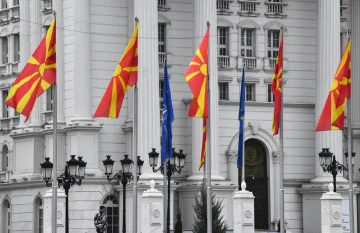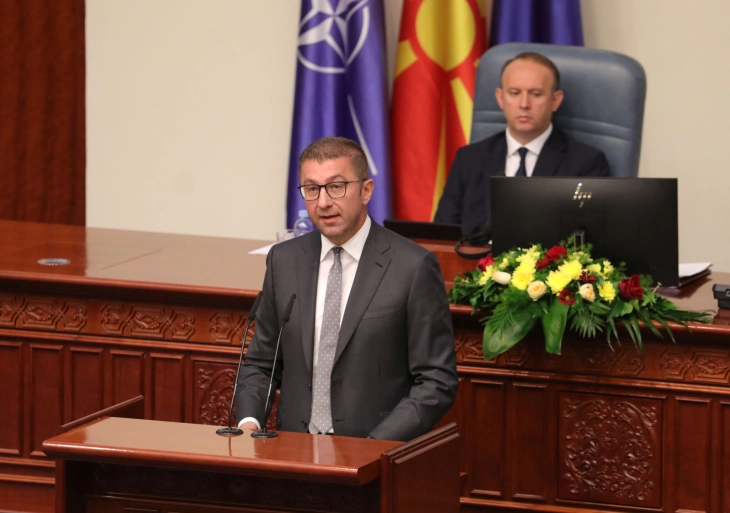The session of the Assembly for the election of the new government, proposed by the mandate holder and leader of VMRO-DPMNE Hristijan Mickoski, should continue today, and the voting will follow after the end of the session, at midnight at the latest. The government will be elected if the majority of the total number of deputies vote for it. The parliamentary majority expected to support the new government in the Legislature consists of 78 MPs: 58 from the VMRO-DPMNE coalition, 14 from Vredi, and six from ZNAM.
The Government’s work program for 2024-2028, submitted to the Parliament by the mandate holder Hristijan Mickoski, is presented in six pillars across over 60 pages. The main goal, as stated, is the restoration of trust in state government institutions, elimination of corruption, and ensuring the rule of law, as well as economic revival aimed at creating productive and well-paid jobs.
The first pillar—quality standard of living and a new cycle of economic growth—emphasizes stable public finances, support for a competitive private sector, support for innovation and the ICT sector, announces productive and high-paying jobs, as well as a national plan for demography. It stands for developed agriculture and a developed and functional infrastructure and energy sector in the service of the state.
“We aim to create productive and well-paid jobs, reduce unemployment, and foster an environment where businesses can flourish. Through strategic investments in infrastructure and energy, we will improve the quality of life of all citizens and ensure sustainable development,” says the Government Program.
The goal of the Government is to reduce the unemployment rate to 7.5% by 2028 and to create 55,000 new jobs in the next four years, maintaining the flat tax and personal income tax at 10 percent.
If unforeseen political and economic disruptions do not occur at the global and regional level, the Program assesses that there are conditions starting from 2025 for GDP growth to range from 3 to 5 percent. A gradual reduction of the budget deficit to a level below 3% of GDP is planned, and it is expected that in the period 2025-2028, the average inflation rate will be between 2% and 2.5% per year.
“The government will respect the independence of the National Bank, with the expectation that through timely measures and activities it will maintain low inflation, stability of the exchange rate, and take care of an efficient financial sector,” the program says.
The program announces the renewal of the branding of Macedonia as a favorable investment destination and worldwide promotion, as well as the establishment of a unique Agency for Foreign Investments and Exports through the merger and rationalization of existing agencies and the provision of a one-stop-shop service for investors.
The government also undertakes to put demographic development in the foreground and envisages increased measures and support for parents, as well as a systemic and comprehensive program to support people who will return from abroad. It is also planned to open a scientific institute for demographic research, migration, and population policy.
“We envisage a program for grants and favorable loans for 150,000 households for one term to install new energy facades, windows, and doors, as well as subsidies for citizens up to 50% for the purchase and installation of solar collectors, heat pumps, and photovoltaic power plants for the production of electricity for their own needs. Households will have the opportunity to sell the surplus of produced electricity under better conditions by changing the existing regulation,” it is foreseen in the Government’s program.
In terms of achieving energy sustainability and independence, the government program foresees the modernization and extension of the working life of TPP “Oslomej”, gasification of TPP “Negotino”, energy transition of REK Bitola, and financing of the Mining and Energy Complex in Eastern Macedonia, as well as active operation of diversification of sources for electricity production.
In the program, the government also undertakes to complete the construction of the Kichevo-Ohrid, Skopje-Blace, and Kichevo-Bukojcani highways, as well as continuing with the agreed sections of Corridors 8 and 10D. The second pillar—anti-corruption front—foresees the reform of the justice system and the systemic fight against corruption.
“Laws will be applied equally to all citizens, regardless of their ethnic, religious, gender, and other affiliations. The government will offer new systemic solutions for the transformation of judicial bodies into truly independent, transparent, responsible, and efficient entities that are the foundation of a normal democratic society. It will be dedicated to freeing the judiciary from the constraints of executive power and implementing policies to clear up the conflict of interests in the judiciary, present nepotism, partisanship, and cronyism,” says the Government’s program.
It foresees the dissolution and legal reform of the Judicial Council and the Council of Public Prosecutors. In a transitional period, the Government will initiate legal changes that will establish strict and objectively measurable criteria that must be met by the new members, elected on the proposal of the Assembly and the President of the State, through a transparent and public procedure that will guarantee the integrity and quality of the selected candidates. The government will initiate a process of changing the Constitution in the part regulating the composition of the Judicial Council and the Council of Public Prosecutors.
The government will also initiate the adoption of a completely new Criminal Code following the example of several related justice systems, the Law on Public Prosecutions, the Law on Courts, the Law on the Judicial Council, the Law on Criminal Procedure, the Law on the Council of Public Prosecutors, and other necessary laws.
“A procedure will be initiated for the review and examination of the legality of the entire operation of the Special Public Prosecutor’s Office, where special attention will be paid to the endangerment of human rights made in the proceedings, violation of procedural laws during the proceedings, clearing up of the established abuses of the payment of financial funds to the prosecutors, investigators, and advisers and their return to the budget, as well as an examination of nepotism, partisanship, and cronyism in employment in the SPO,” says the Government’s program.
The third pillar—rule of law in institutions—foresees reforms in the political system and public administration, accessible public services – Smart Macedonia, as well as developed local governments and balanced regional development.
“The government will promote a policy of understanding and cooperation in the process of democratic reform, advocating for the principle of ‘national consensus.’ We will strive to achieve as comprehensive a political consensus as possible in the conduct of politics during the creation and implementation of projects and policies with long-term significance and value for the state,” says the Government’s program.
In that direction, the Government will support the comprehensive discussions in the Assembly on: amendments to the Constitution that will enable an Assembly of 90 deputies, as well as systemic and legal reforms for the introduction of one electoral unit for the election of deputies, the abolition of the electoral census for the President, abolishing the concept of the so-called Technical government, reform of the Constitutional Court, and establishment of the possibility to dismiss the mayor.
The fourth pillar—a functional institutional system—emphasizes a quality health system and education for the future, a clean environment, social care, and dedicated care for retirees.
“Education and health are at the heart of our agenda. We will implement reforms to improve the quality and availability of education, preparing citizens for the challenges of the modern world. Our health system will be strengthened to provide safe and high-quality care for every citizen. We will focus on social cohesion, supporting families, promoting equal opportunities, and protecting the rights and freedoms of all individuals,” the government program says.

For pensioners, we will provide 5,000 denars more for pensions in the first year of the mandate.
The fifth pillar—national priorities—outlines the priorities in foreign policy, security and defense, culture as a pillar of the state, as well as developed tourism and sports as national pride.
“Our commitment to European integration remains firm. We will work diligently to align our policies with European standards, advancing our goal of full membership in the European Union. This approach will bring stability, economic growth, and enhanced international cooperation, ensuring a better future for citizens,” according to the Government’s program for the period 2024-2028.
The sixth pillar—rights and freedoms—puts women at the center of Macedonian society and young people in focus, free and independent media, as well as support for the civil sector and government transparency and accountability.
“Culture and tourism are of vital importance for the Macedonian national identity and economic prosperity. We will invest in the development of cultural infrastructure, support the arts, and promote the rich heritage domestically and internationally.”




Comments are closed for this post.